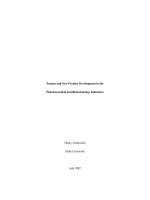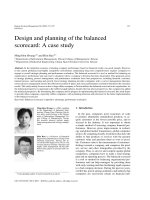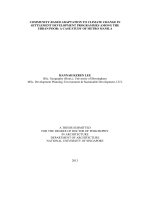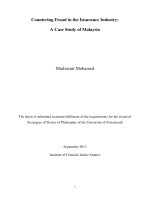new product development in the fashion industry a case study in vietnam
Bạn đang xem bản rút gọn của tài liệu. Xem và tải ngay bản đầy đủ của tài liệu tại đây (940.54 KB, 77 trang )
<span class="text_page_counter">Trang 1</span><div class="page_container" data-page="1">
VIETNAM NATIONAL UNIVERSITY HO CHI MINH CITY HO CHI MINH CITY UNIVERSITY OF TECHNOLOGY
---o0o---
DUONG QUANG HAO
<b>NEW PRODUCT DEVELOPMENT IN THE </b>
<b>FASHION INDUSTRY: A CASE STUDY IN VIETNAM </b>
Major: Industrial Engineering Major ID: 8520117
<i><b>MASTER THESIS </b></i>
<i>HO CHI MINH CITY, January 2024</i>
</div><span class="text_page_counter">Trang 2</span><div class="page_container" data-page="2">i
<b>THIS RESEARCH IS COMPLETED AT: </b>
<b>HO CHI MINH CITY UNIVERSITY OF TECHNOLOGY – VNU HCM </b>
Instructor: Assoc. Prof. PhD Do Ngoc Hien ...
Examiner 1: PhD Do Thanh Luu ...
Examiner 2: PhD Le Song Thanh Quynh ...
Master’s Thesis is defended at HCMC University of Technology, VNU-HCM on January 27<small>th</small> 2024. The Board of The Master’s Thesis Defense Council includes: 1. Chairman: PhD Nguyen Vang Phuc Nguyen ...
2. Secretary: PhD Nguyen Duc Duy...
3. Counter-Argument Member: PhD Do Thanh Luu ...
4. Counter-Argument Member: PhD Le Song Thanh Quynh ...
5. Council Member: PhD Duong Quoc Buu ...
Verification of the Chairman of the Master’s Thesis Defense Council and the Dean of the Faculty of Mechanical Engineering after the thesis is corrected (if any). CHAIRMAN OF THE COUNCIL DEAN OF FACULTY OF MECHANICAL ENGINEERING
</div><span class="text_page_counter">Trang 3</span><div class="page_container" data-page="3">ii
VIETNAM NATIONAL UNIVERSITY HCMC SOCIALIST REPUBLIC OF VIETNAM VNUHCM UNIVERSITY OF TECHNOLOGY Independence – Liberty – Happiness __________________ _______________________
<b>MASTER’S THESIS ASSIGNMENTS </b>
Full name: DUONG QUANG HAO...Learner ID: 2270128... Date of birth: September 01, 2000... Place of birth: Gia Lai... Major: Industrial Engineering... Major ID: 8520117...
<b>I – TITLE: NEW PRODUCT DEVELOPMENT IN THE FASHION INDUSTRY: A </b>
CASE STUDY IN VIETNAM/ PHÁT TRIỂN SẢN PHẨM MỚI TRONG NỀN CÔNG NGHIỆP THỜI TRANG NHANH: MỘT NGHIÊN CỨU ĐIỂN HÌNH TẠI VIỆT NAM
<b>ASSIGNMENTS AND CONTENT: Assignments: </b>
• Understanding the importance of New Product Development process. • Suggesting a preper New Development Process for better efficiency. • Applying the New Product Development in a case study in practical.
<b>Content: </b>
• Chapter 1 gives some introduction and determines the goal and scope of the study. • Chapter 2 reports the literature review and shows the methodology of the study. • Chapter 3 presents the research object.
• Chapter 4 presents in detail the case study related to the topic mentioned. • Chapter 5 gives conclusion statements and some suggestions for future studies.
<b>II – ASSIGNMENT DELIVERING DATE (based on the Decision on Assignments </b>
</div><span class="text_page_counter">Trang 4</span><div class="page_container" data-page="4">iii Delivering): 05/09/2022
<b>III – ASSIGNMENT COMPLETING DATE (based on the Decision on </b>
Assignments Delivering): 27/1/2024
<b>IV – INSTRUCTOR: Assoc. Prof. PhD Do Ngoc Hien. </b>
Ho Chi Minh City, 15<small>th</small> February, 2024
<b> INSTRUCTOR HEAD OF DEPARTMENT </b>
<b>DEAN OF FACULTY OF MECHANICAL ENGINEERING </b>
</div><span class="text_page_counter">Trang 5</span><div class="page_container" data-page="5">
iv
<i><b>ACKNOWLEDGEMENTS </b></i>
During the time of researching and studying to complete the graduation thesis
<i>with the topic "NEW PRODUCT DEVELOPMENT IN THE FASHION INDUSTRY: A CASE STUDY IN VIETNAM", I have received a lot of help from my teachers, my company and my friends. </i>
I would especially like to thank Dr. Do Ngoc Hien and Dr. Nguyen Duc Duy for his instructions in detailing and developing my idea, his advises help me improve my thesis report to a higher level. I also want to thank my company, Thanh Cong, for giving me a precious opportunity that I could do a further research and complete my graduation thesis here.
Despite some remaining imperfections in this graduation thesis, this report reflects my efforts to do research on the topic “product development”. I feel so grateful if I could receive comments and suggestions about this report for the further knowledge. Thank you!
<i>Ho Chi Minh city, 2023 </i>
</div><span class="text_page_counter">Trang 6</span><div class="page_container" data-page="6">v
<b>ABSTRACT </b>
The proposed new approach for the New Product Development (NPD) is intended to enhance the competitive advantages of start-up businesses facing many problems related to lack of investment, available market information and experience in the industry. The new products were mainly developed by doing competitors analysis and checking voice of customers. First, identifying the top competitors of the companies by Competitor Profile Matrix (CPM) method. Then, the best-selling items of the top 3 competitors would be analyzed to define the essential factors that can be favored by the customers. After that, the new functions of product would be added by checking customers feedbacks. Finally, the samples would be made for further improvement.
The time required for New Product Development process can be shortened to within 2 weeks and the budget can be reduced significantly by doing competitor analysis because the companies can directly apply essential factors of best-selling items without having to make so many options and tests. Besides, the risk of failure can also be decreased if the companies follow top-selling product characteristics.
The proposed approach provides valuable insights about new product development in fashion companies regarding new product development strategies. The study addressed concerns of many start-up businesses, and remedies some of the limitations of the previous methodology. The approach gives companies a competitive edge by enabling them to innovate more effectively and efficiently within a limited budget and time.
<b>Keywords: New product development (NPD); Customer surveys; Competitor </b>
analysis; Fashion industry; Business strategy…
</div><span class="text_page_counter">Trang 7</span><div class="page_container" data-page="7">vi
<b>TÓM TẮT ĐỀ TÀI </b>
Cách tiếp cận được đề xuất trong báo cáo này về lĩnh vực phát triển sản phẩm nhằm mục đích nâng cao khả năng cạnh tranh cho cách doanh nghiệp khởi nghiệp. Các doanh nghiệp này thường gặp các vấn đề như thiếu chi phí đầu tư, thông tin thị trường hay kinh nghiệm trong ngành. Sản phẩm mới theo cách tiếp cận này sẽ được phát triển chủ yếu thơng qua phân tích đối thủ cạnh tranh và kiểm tra tiếng nói của khách hàng. Đầu tiên, bằng phương pháp “Competitor Profile Matrix” (CPM), cơng ty có thể xác định được các đối thủ cạnh tranh trực tiếp lớn nhất trên thị trường. Sau đó, các sản phẩm bán chạy nhấn của 3 đối thủ cạnh tranh lớn nhất sẽ được chọn ra để nghiên cứu nhằm tìm ra các nhân tố chủ chốt dẫn đến sự thành công cho các sản phẩm này. Sau đó, thơng qua việc kiểm tra đánh giá của khách hàng về các sản phẩm bán chạy, công ty có thể tìm ra và thêm vào những tính năng mới nhằm khắc phục các điểm của sản phẩm chưa làm khách hàng hài lòng. Cuối cùng, mẫu thử sẽ được làm để đánh giá và cải thiện hơn.
Khi áp dụng cách tiếp cận này, thời gian dành cho phát triển sản phẩm mới có thể được rút ngắn xuống chỉ cịn 2 tuần và chi phí dành cho dự án cũng sẽ được tối thiểu đáng kể vì cơng ty khơng cần làm q nhiều mẫu thử nhiều lần để kiểm tra và chỉnh sửa. Ngoài ra, rủi ro thất bại cũng sẽ được giảm thiểu vì công ty đang đi theo những đặc điểm mà các sản phẩm bán chạy nhất trên thị trường theo đuổi.
Cách tiếp cận được đề xuất trong bài này cũng cấp những góc nhìn giá trị về vấn đề phát triển sản phẩm mới trong thị trường thời trang nhanh thơng qua nghiên cứu điểm hình. Nghiên cứu đã giải quyết được những nỗi lo ngại cuả các doanh nghiệp khởi nghiệp cũng như giải quyết được các giới hạn của các phương pháp truyền thống. Cách tiếp cận này giúp các công ty gia tăng lợi thế cạnh tranh vì họ có thể khơng ngừng sáng tạo và cải tiến chỉ với một ngân sách và quỹ thời gian ít ỏi.
Từ khóa: Phát triển sản phẩm, khảo sát khách hàng, phân tích đối thủ, thời trang nhanh, chiến lược doanh nghiệp…
</div><span class="text_page_counter">Trang 8</span><div class="page_container" data-page="8">vii
I hereby declare that this is my own research. All the data and the results used in this research are honest and have not been published in other studies. I will be totally responsible for my research if it is incorrect as mentioned above.
The research’s author
DUONG QUANG HAO
</div><span class="text_page_counter">Trang 9</span><div class="page_container" data-page="9">TABLE OF CONTENTS ... viii
LIST OF FIGURES ...xi
LIST OF TABLES ... xii
TABLE OF ACRONYMS ...xiv
<i>2.2.1 Project management method ... 7 </i>
<i>2.2.2 Data collection method ... 8 </i>
<i>2.2.3 Competitor selection method ... 8 </i>
</div><span class="text_page_counter">Trang 10</span><div class="page_container" data-page="10">4.3 General Requirements for New Products ... 17
4.4 New Product Development Idea Generating. ... 17
<i>4.4.1 Step 1: Market research – Competitors Analysis and Customer Research . 17 4.4.2 Step 2. Identify essential factors for best-selling items ... 22 </i>
<i>4.4.3 Step 3: Developing Draft Designs (detailed design) ... 31 </i>
<i>4.4.4 Step 4. Make a Sample and Test ... 32 </i>
4.5 New Product Development Project Management... 36
<i>4.5.1 Project timeline ... 36 </i>
<i>4.5.2 Human Resource management ... 38 </i>
<i>4.5.3 Pricing & Sale Management ... 40 </i>
<i>4.5.4 Finance Management ... 42 </i>
<i>4.5.5 Risk Management ... 45 </i>
4.6 Result Evaluation of the Method ... 46
<i>4.6.1 Status of application ... 46 </i>
</div><span class="text_page_counter">Trang 11</span><div class="page_container" data-page="11">x
<i>4.6.2 Result evaluation ... 47 </i>
4.7 Future Application for the New Product Development Process ... 48
CHAPTER 5. CONCLUSION AND RECOMMENDATION ... 50
</div><span class="text_page_counter">Trang 12</span><div class="page_container" data-page="12">xi
<b>LIST OF FIGURES </b>
Figure 2.1. Project life cycle [Westland (Placeholder1)(2007)] ... 8
Figure 2.2. Methodology ... 9
Figure 3.1. Thanh Cong company ... 11
Figure 3.2. Thanh Cong company award in recent years (Source: Company website) 12 Figure 3.3. TC Commerce (De Closet) - fashion platform of Thanh Cong ... 13
Figure 3.4. Customers of Thanh Cong garment manufacturing export ... 14
Figure 4.1. Vietnamese Streetwear market... 18
Figure 4.2. 4-way stretch fabric & 2-way stretch fabric (Source: Internet) ... 24
Figure 4.3. Monthly sales of “Levents Popular Logo 2.0” collection by color ... 25
Figure 4.4. Designs from competitor Levents with 4 different types of design ... 29
Figure 4.5. Competitors using type 4 design ... 30
Figure 4.6. Draft design ... 32
Figure 4.7. Manufacturing Process ... 33
Figure 4.8. AON network of the project... 38
Figure 4.9. Gantt chart for project ... 38
Figure 4.10. Adjustments for next NPD project of the company ... 49
</div><span class="text_page_counter">Trang 13</span><div class="page_container" data-page="13">xii
<b>LIST OF TABLES </b>
Table 4.1. Project Stakeholders ... 16
Table 4.2. General requirement for New Product ... 17
Table 4.3. Choosing competitors by CPM method ... 19
Table 4.4. Customers Interview Questionnairs ... 20
Table 4.5. Identifying competitor's strengths and weaknesses ... 22
Table 4.6. Choosing fabric for new products ... 23
Table 4.7. Suggested size chart for a new collection ... 26
Table 4.8. Levents selling monthly by type of design ... 28
Table 4.9. Choosing design type ... 29
Table 4.10. Design orientation of new products ... 30
Table 4.11. Details in the draft design ... 31
Table 4.12. Selecting fabric suppliers ... 33
Table 4.13. Evaluating manufacture factory ... 34
Table 4.14. Choosing manufacture factory ... 34
Table 4.15. Material Quantity Calculation ... 35
Table 4.16. Quality Control ... 36
Table 4.17. Project Estimated Timeline ... 36
Table 4.18. Human resource for project ... 38
Table 4.19. Human Resource Allocation by Period ... 39
Table 4.20. Pricing of New Product ... 40
Table 4.21. Price Management ... 41
Table 4.22. Sale & Marketing cost distribution ... 41
Table 4.23. Estimated Cost of Project ... 42
</div><span class="text_page_counter">Trang 14</span><div class="page_container" data-page="14">xiii
Table 4.24. Estimated Profit of Project ... 44
Table 4.25. Risk management ... 45
Table 4.26. Project application status ... 46
Table 5.1. Master Thesis ... 51
</div><span class="text_page_counter">Trang 15</span><div class="page_container" data-page="15">7 S&A Sale and Administration
</div><span class="text_page_counter">Trang 16</span><div class="page_container" data-page="16">In the last decades, the market has changed rapidly and continuously, increasing the importance of investing in the development and innovation of all companies (M. Rossi et al. [9]). The product innovation and development processes are crucial and essential for ensuring the survival of business companies (S. Kumar et al. [10]). In addition, A. Distanont and O. Khongmalai [11] proved innovation's irreplaceable role in enhancing the SME level's competitive advantages, especially in the frozen food industry. A. Distanont and O. Khongmalai also concluded that innovation or product development is becoming the strategic tool for enhancing business to gain competitive advantages among other competitors. As a result, product development is now playing an essential role in all enterprises' strategic plans. However, in the fashion industry, the success rate of NPD's project is relatively low because of the increased time and cost, difficulty in scheduling, and short product life cycles (D. S. Dewi et al. [12]).
</div><span class="text_page_counter">Trang 17</span><div class="page_container" data-page="17">2
<b>1.2 Problem Statement </b>
This paper formulated a method to develop new products, mainly depending on competitor analysis and customer surveys. This method is especially suitable for products that become outdated rapidly or companies that want to expand into brand-new business areas. By identifying customers’ needs and analyzing competitors’ current products, researchers and the product development department (R&D) shorten the time to develop new products to meet the market's current needs. A new product developed by this method is expected to leverage almost the existing strengths of competitors’ products and have unique functions to solve customers’ inconveniences.
The new approach is applied and verified by a case study of a start-up company in the fashion industry, where the business focuses on producing clothing quickly and inexpensively to meet the demands of current fashion trends (R. Bick et al. [13]). In this research, a new T-shirt collection can be planned by combining customer surveys and competitor analysis. According to S. K. Wardoyo and R. H. Walean [14], customers prefer T-shirts from global fashion brands instead of local brands because of their quality and prestige, raising competitiveness. As a result, a start-up company may find it challenging to launch a completely new T-shirt collection to compete. Therefore, new T-shirt design development methods based on top competitor analysis and customer surveys can help researchers and R&D shorten the time to find the essential factors of best-selling items of successful local brands in the market and increase the competitiveness of the new brand in this fierce market. In the past, the importance of the benchmarking process, which encourages enterprises to learn from lead players in the market, has also been mentioned (S. Zailani et al. [15]).
<b>1.3 Research scope </b>
Research period: 1<small>st</small> February 2023 – 1<small>st</small> July 2023 Research object: Thanh Cong company.
</div><span class="text_page_counter">Trang 18</span><div class="page_container" data-page="18">The report has the following specific objectives:
- Suggest the proper NPD method for start-up companies & companies want to expand new business model.
- Apply for a case study in practical.
- Evaluate the efficiency by checking the result after fixed period.
<i>- Chapter 2: Literature Review and Methodology </i>
Chapter 2 provides academic concepts related to methods used in the research. This chapter also provides a methodology that presents the reporter's approach to solving problems mentioned in the previous chapter.
<i>- Chapter 3: Introduction to Research Subject </i>
Chapter 3 introduces general information on the research subject, such as the company's achievements, the company's products, and the company's customer segments.
<i>- Chapter 4: New Product Development Application In Fashion Industry </i>
</div><span class="text_page_counter">Trang 19</span><div class="page_container" data-page="19">4
Chapter 4 introduced the case study, which apply the suggested method of New Product Developments process. Besides, the project management method also included in this chapter to manage the new product development process mentioned in this chapter. Finally, the results are recorded to highlight the effectiveness of this method via applications in the case study.
<i>- Chapter 5: Conclusion and Recommendations </i>
Chapter 5 evaluates the completion level of the report, and it also assesses the advantages and remaining disadvantages. Some recommendations for plans to develop this research's ideas also be mentioned.
</div><span class="text_page_counter">Trang 20</span><div class="page_container" data-page="20">5
<b>CHAPTER 2. LITERATURE REVIEW AND METHODOLOGY </b>
<b>2.1 Literature Review </b>
<b>2.1.1 New product development applications </b>
New product development projects have already been paid attention by researchers and industries. Depending on the scope of each project, different approaches were applied to develop new products in different areas. A. M. Benur and B. Bramwell analyzed and researched tourism product development and product diversification to attract more tourists to a particular destination. In the mechanical area, A. Albers et al. developed a product development method called product Generation Engineering (PGE) and applied it to produce a Dual Mass Flywheel (DMF). Albers argued that the first product generation often lacks essential factors to be successful in the market, and the PGE approach can upgrade the first product version to reach the necessary level of product maturity. With a different approach, S. Altuntas et al. [16] adopted Quality Function Deployment (QFD), a customer-oriented approach to develop an electric towing vehicle in the mechanical field. In the Food and Beverage (F&B) industry, R. Filieri [17] successfully established an NPD project in a food company by collecting many customers’ ideas, while R. L. Helmi [18] improved the healthy drink product by analysing the failures of other NPD projects in the company. In the medical field, the NPD process can be more complicated, especially with products directly affecting human health, and clinical trials are required in the NPD process of medical products to ensure efficiency (K. L. Miller et al.). Moreover, by deploying the same co-creation approach with customers, L. López-Mas et al. also proved the importance of customers’ opinions in the beginning stage of the NPD process to develop new fish products in 3 different European countries. Overall, NPD projects in all fields begin with the ideas brainstorming stage. Although there are various ways to implement, the ideas for new products are typically inspired by customers' needs or the imperfection of the company’s current product.
Focusing on the fashion industry, R. Bandinelli et al. [19] investigated eight Italian companies’ NPD processes and concluded that most of them started their NPD projects
</div><span class="text_page_counter">Trang 21</span><div class="page_container" data-page="21">6
by studying from the market research, selecting proper features to apply, and finally making prototypes to test their ideas. Besides, a technical approach using 3D Virtual Prototyping was also suggested as a potential NPD tool in the fashion industry in the near future despite some obvious disadvantages (E. Papahristou and N. Bilalis [20]). Moreover, the make-to-order concept to meet the needs of every customer and setting up a strategic alliance with a textile expert to develop signature fabric are two other approaches for developing denim fashion products in Indonesia fashion start-up companies, which are mentioned in research by R. Nurcahyo et al. [21]. Nevertheless, these two approaches necessitate significant financial investment and entail considerable risk, particularly for start-up businesses.
<b>2.1.2 Research gap </b>
The fashion industry has expanded rapidly in the last two decades (B. V. Todeschini et al. [22]), it requires fashion companies to continuously improve and innovate their products to meet the customers needs and timely catch up with market trends. However, not much research have been done to develop an NPD approach to optimize the process for this field. In fact, available studies about NPD projects in the fashion area mainly focused on evaluating the importance of the NPD process to increase competitive advantages, not emphasising how to do it effectively. Especially in fashion, there are many risks of challenging time scales, short product life cycles, and unpredictability (R. Parker-Strak et al. [23]), strengthening the importance of a new suitable NPD approach to tackle those problems. In order to explore this gap, this study would propose an NPD method for companies in the fashion industry, which can shorten the time to brainstorm new product ideas, reduce the risk of failure and quickly meet customer needs by combining competitor analysis and customer surveys.
<b>2.2 Methodology </b>
In this section, the proposed methodology is presented in detail. The New Product Development process is controlled by applying the project management method. The main difference of the approach mentioned in this research is in the ideas generation
</div><span class="text_page_counter">Trang 22</span><div class="page_container" data-page="22">7
step, where the companies could shorten the time and reduce the risk of failure. Data collection and competitor identification are two different skills used in the case study.
<b>2.2.1 Project management method </b>
There are many different ways to define a “project”. According to Harold, a project can be considered to be any series of activities and tasks that having a specific objective to be completed, having defined start and end dates, having funding limits and consuming human and nonhuman resources. According to Robert, a project is a sequence of unique, complex, and connected activities that have one goal or purpose and that must be completed by a specific time, within budget, and according to specification. According to Project Management Institute , project management is the application of knowledge, skills, tools and techniques used to meet project objectives and its requirements. On the other hand, Richard simply defines project as a task with desired end point. To recapitulate, project is basically solving a problem. Problem here can be defined as a new objective that an organization wants to achieve or a current bad situation that a team want to solve.
Nowadays, project management is one of the most essential aspects that affect the development of bussinesses. If organizations have a good project management system, they can save time and resource to solve a problem, then make better business decisions. Kuster et al. states that project management nowadays are used not just to manage complex tasks in technical environments, but also for problem solving and crisis situations in all management fields, such as Marketing, finance and corporate organization. This is why planning and managing a project effectively is extremely important and necessary.
The traditional project management method is applied to manage the NDP process effectively. Institute divides the project life cycle into four stages: Starting the project, organizing and preparing, carrying out the project work and closing the project. According to J. Westland [24], the project life cycle consists of 4 main stages, including project initiation, project planning, project execution and project closure (Figure 2.1). Besides, in many practical works, the third stage can be separated into two small stages:
</div><span class="text_page_counter">Trang 23</span><div class="page_container" data-page="23">8
implementation and monitoring. Although the names of each step in different documents cannot be similar, each stage's purposes remain the same. In this research, we mainly focus on the initiation phase.
<i>Figure 2.1. Project life cycle [Westland (Placeholder1)(2007)] </i>
<b>2.2.2 Data collection method </b>
This research collects data for evaluating competitors, identifying best-selling items on the market, checking fashion trends and applying for new product design. Two main data collection methods are observation and customer surveys.
• Observation: The data and selling performance of competitors are observed through the number of sales and customer reviews in the e-commerce of competitors such as Shopee, TikTok Shop, Facebook., etc.
• Customer survey: Surveys were conducted to evaluate the strengths and weaknesses of current products in the market of competitors and to check the reaction of customers to innovate new functions of new developing products.
<b>2.2.3 Competitor selection method </b>
Selecting proper competitors is an important step to help decision-makers have suitable strategies for the company. In the NPD aspect, researching competitors’ products can enhance the firm's competitive advantages by making new products that can resolve the imperfection of competitors’ products. In this research, the competitors selection tool is the Competitive Profile Matrix (CPM). S. M. Sohel et al. [25] stated that Competitor Profile Matrix (CPM) is a supportive tool for assessing major competitors using critical success factors. CPM analysis can identify the industry's most
</div><span class="text_page_counter">Trang 24</span><div class="page_container" data-page="24"><i>Figure 2.2. Methodology </i>
By adopting our model, start-up companies are able to expand into new business areas, even if they lack the experience or database to develop new products. Based on this approach, firstly, the company needs to identify the competitors in the same market share and have some prominent achievements. Then, the best-selling items of competitors are analyzed. The purpose of this stage is to define the essential factors of
</div><span class="text_page_counter">Trang 25</span><div class="page_container" data-page="25">10
successful products in order to satisfy the customers. Besides, by checking customer feedback on social media or selling platforms, the weaknesses, dissatisfaction, and imperfections of our competitors’ products could be recognised, which later can become the new functions of our company’s products to increase competitive advantages. After identifying factors of best-selling items and new potential features, the R&D department can start developing detailed designs for new products. Finally, samples are made, and customer surveys are conducted to continuously improve the product to be ready for mass manufacturing and commercialization.
This methodology focuses on 2 aspects of a new product: applying success factors of current top-selling products and fixing the missing points of those products that can be developed more to increase customer satisfaction. However, though the application of success factors is essential for all new product developments, the new functions are optional depending on the abilities of the companies and the effective level of those new functions.
</div><span class="text_page_counter">Trang 26</span><div class="page_container" data-page="26"><i>Figure 3.1. Thanh Cong company </i>
Company vision is with desiring and working creativity every day, they want to create products of outstanding value associated with the sustainable development strategy, towards the leading position in the global textile and apparel market in the coming time.
The company mission is that they work for:
- Customers: who are benefited by our products and services.
</div><span class="text_page_counter">Trang 27</span><div class="page_container" data-page="27">12
- Investors: Who trust in our integrity and knowledge for their financial gain. - Employees: Who become more confident in their lives through the meaningful contribution.
- Suppliers: Who are satisfied with our fair and transparent deal. The core values of the company is working for:
- Profitability: To need to maintain the sustainable profits for all the stakeholders as well as the enhance of the Company.
- Integrity: To try to be intergrated in the course of the business.
- Learning: To consider that our working place is the learning place in terms of finding talents and cultivation knowledge & character.
- Serving: To serve our Customers as a king and social minorities as a family with our sincerity & passion.
Thanh Cong company has received many awards throughout their working time as following picture:
<i>Figure 3.2. Thanh Cong company award in recent years (Source: Company website) </i>
</div><span class="text_page_counter">Trang 28</span><div class="page_container" data-page="28">13
<b>3.2 Introduction of Company Business </b>
The company business mainly focuses on garment manufacturing export (all types including all kinds of cotton, fiber, yarn, fabric, garments, shoes and machinery, equipment, spare parts, raw materials, materials and chemicals but except toxic chemicals, dyes, packaging).
In the recent years, due to the development of the world, companies start to expand their business to fashion retail industry and real estate businesses. About fashion retail industry, Thanh Cong start its vision by opening TC Commerce – a fashion e-commerce platform. E-commerce means establishing and operating e-commerce website (excluding website that is directly involved in securities trading) or application to provide e-commerce service.
<i>Figure 3.3. TC Commerce (De Closet) - fashion platform of Thanh Cong </i>
In the next year, Thanh Cong wants to expand their business more. Starting with opening a new fashion brand, Thanh Cong wants to utilize their manufacturing advantage to be successful in retail area. However, Thanh Cong company is not setted up for retail industry. That is why a new methodology suggested in this report is really necessary and proper for Thanh Cong to develop and finish this new mission.
</div><span class="text_page_counter">Trang 29</span><div class="page_container" data-page="29">14
<b>3.3 Introduction of Customers </b>
With the position of a leading company in Vietnam’s Textile and Apparel industry, Thanh Cong has owned a wide customer network around the world. Over the past years, Thanh Cong has actively integrated into the world, expanded its portfolio of potential customers, and uplifted the brand name of Vietnam’s textile and apparel exports. In which, its main customers come from the US, Japan, South Korea, China, and Europe.
<i>Figure 3.4. Customers of Thanh Cong garment manufacturing export </i>
<b>3.4 Company Problem </b>
As being mentioned in previous part, Thanh Cong company wants to expand their business, starting with opening a fashion private brand. The purpose of it is that Thanh Cong wants to build up a new growth engine for future. Besides, they want to step by step develop as a comprehensive enterprise which can serve everything in life for everyone in Vietnam.
To achieve this, Thanh Cong has to firstly clarify their product. Although Thanh Cong has had some experience with fashion industry before with Esitto brand (women
</div><span class="text_page_counter">Trang 30</span><div class="page_container" data-page="30">15
casual wearing) and knowledge from invest company, this is the first time they try with Streetwear styles. Besides, the operation process within Thanh Cong is not made for retail industry and neccesary resources including private design team, domestic sale team… needs to be rebuilt with past experience including Product Development process.
Because the market in fashion industry in Vietnam is competitive now, an effective NPD method is required. This is why a new product development project will be conducted in Thanh Cong company to help companies develop their first Streetwear fashion collection to officially enter the market with minimum risk.
</div><span class="text_page_counter">Trang 31</span><div class="page_container" data-page="31">16
<b>CHAPTER 4. NEW PRODUCT DEVELOPMENT APPLICATION IN FASHION INDUSTRY </b>
<b>4.1 New Product Development Project Introduction </b>
Thanh Cong company intends to expand a new business to become a local fashion brand and develop a new streetwear product. The company has some requirements for this project:
(1) The first products are T-shirts, which would be sold mainly on online channels in Vietnam, including Shopee, Tiktok Shop, Facebook, and Instagram, to mention a few
(2) The first product is high-quality with the target price and possible to be sold 100%,
(3) Customer segment is ranged from 18 from 25 years old.
(4) Time interval from ideas generated and production completed is within 2 months.
The new industry that company wants to join in is fashion industry with streetwear style for young generation. Because Thanh Cong is mainly specialist in garment manufacturing, retail selling in fashion industry is a new area to the company. To achieve the company target when entering this area and quickly take a high market share, the new product development method is suggested to apply to reduce the risk of failure and save the unnecessary budgets. This method mainly focuses on the idea generating stage because it would decide the whole direction and selling ability for a new products. If we cannot make a product that meet the demand of the market, we can fail.
<b>4.2 Project Stakeholders </b>
The project has 5 main Stakeholders:
<b>Table 4.1. Project Stakeholders </b>
<b>Stakeholder Impact to project </b>
CEO of ABC company Decide the budget/ products quantity for the project.
</div><span class="text_page_counter">Trang 32</span><div class="page_container" data-page="32">Competitors Affect the market as well as selling ability of new product
<b>4.3 General Requirements for New Products </b>
The general requirements for new products development project have been decided through meetings of CEO and other departments. The requirements for project has been listed on the Table 4.2:
<b>Table 4.2. General requirement for New Product </b>
1 The average price of new product is from 300,000 VND – 400,000 VND 2 Tiktok Shop and Shopee are chosen to be main selling channels
3 Marketing strategy of new product will concentrate on posts/video on social media
4 Minimize the cost and utilize all necessary resources of the company 5 Product will have suitable size/form for Vietnamese people
6 Target to make 20 different designs with 2000 units in total and sell in 3 months 7 Project budget: 200,000,000 VND
<b>4.4 New Product Development Idea Generating. </b>
<b>4.4.1 Step 1: Market research – Competitors Analysis and Customer Research </b>
a) Competitors Analysis
In Vietnam, the Streetwear fashion market has been developing rapidly. There are over 100 different Streetwear local brands established in recent years. Figure 4.1 lists one of the most prominent brands in the market, which follow streetwear styles in
</div><span class="text_page_counter">Trang 33</span><div class="page_container" data-page="33">18
Vietnam (the famous level is listed based on followers quantity on all social platforms). This industry is extremely competitive, which required new brands to define who are their main competitors and identify their unique points to compete in this market.
.
<i>Figure 4.1. Vietnamese Streetwear market </i>
Identifying the top competitors in the market is important because they are currently leading the fashion industry. If we can provide the customers with what they are selling with better quality and more innovative design, we can replace their position in the market sooner or later. The Competitor Profile Matrix (CPM) method is applied to identify the top competitors. The critical success factors used to evaluate the competitors in this CPM are fabric quality (1), perfection level of finished product (2), packaging quality (3), reputation (4), the creativity of design (5), unique level (6) and marketing strategy (7). The factors are decided based on the purpose of this market research: finding top local brands to develop products with trendy designs and styles for customers. Notably, nearly 73% of purchasing decisions occur at the point of sale. Hence, the creativity of design plays a pivotal role in differentiating brands and elevating products above the competition, shaping specific perceptions in consumers' minds (P.
</div><span class="text_page_counter">Trang 34</span><div class="page_container" data-page="34"><b>Table 4.3. Choosing competitors by CPM method </b>
</div><span class="text_page_counter">Trang 35</span><div class="page_container" data-page="35">20 Wei.
<b>Table 4.4. Customers Interview Questionnairs </b>
1/ How old are you? Checking customers target
</div><span class="text_page_counter">Trang 36</span><div class="page_container" data-page="36">21 Basic
customers’ point of view.
Checking the design
4/ With the price of 350.000, which will you buy among best selling items of 3 selected brands?
Checking design areas => Which factors make customers like? 5/ What can be improved to be more
attractive?
Checking the size
6/ Which T-shirt form is your favorite among best-selling items from 3 selected
brands? <sup>Checking size and identify </sup>the best form might have. 7/ Any recommendation for adjusting
the size? Checking
the fabric quality
8/ Which fabric of best-selling items from 3 selected brands that you like? What have to improve?
Check fabric quality required by customers.
Checking
the color <sup>9/ Which color impresses you the most? </sup>
Find the color that customers like.
Checking promotion
10/ Is there any promotion types of those brands interest you to buy their product?
Find the effective
promotion campaign for mass-selling.
The researchers also search for review of customers on online selling platforms of those 3 brands. The purpose of this action is to identify the dissatisfaction of customers for those top-seling items through negative comments and its ratio. The results of both
</div><span class="text_page_counter">Trang 37</span><div class="page_container" data-page="37">22
customers interview and online review checking are summarized in table 4.5. The company's new products are expected to have all the current strengths of 3 competitors and improve all the weaknesses with new functions.
<b>Table 4.5. Identifying competitor's strengths and weaknesses </b>
<b>Competitors Strengths Weaknesses </b>
Brand A
- Signature graphic designs - Goof fabric quality – thick fabric & cotton 100%
- Various color mixing
<b>- Size control (Size is too big) </b>
- Limited target audience
- Lack of promotion activities
<b>- Lack of signature design (design is quite basic and not unique) </b>
- Packaging is not attactive
<b>- Poor fabric quality (especially </b>
T-shirt collar)
- Lack of product variety
<b>4.4.2 Step 2. Identify essential factors for best-selling items </b>
In this NPD, four main aspects of a T-shirt are developed: fabric, colour, form and graphic design.
a) Fabric
There are two main features of fabric that we need to research, including the weight of the fabric and the type of material. Generally, brands A, B and C all use 100% Cotton
</div><span class="text_page_counter">Trang 38</span><div class="page_container" data-page="38">23
fabric for their T-shirts. However, the fabric's weight and the Cotton type are pretty different. While brand C uses fabric with less than 200 gsm (grams per square meter), the weight of the fabric used by brands A and B is at least 230 gsm. Based on customer reviews on social media, we realize Vietnamese customers prefer thick-fabric T-shirts like brand A and brand B, while thinner fabric of brand C has received lots of negative complaints. Besides, the weight of fabric will effect directly to the cost of finished products. Therefore, company has to make decisions among lower cost or better quality of products. Finally, because the target of the company for this project is making high-quality product, the first t-shirt collection will be suggested to accept the higher cost and make with cotton 100% 230 gsm for 2 reasons: (1) to satisfy customers (customers like thick fabric of brand A and brand B with same fabric weight), (2) to compete with competitors. In the long-term strategy, to utilize the advantages of self-manufacturing factory and experience in export garment manufacturing, the company would develop new signature functioned – fabric for this private brand. The higher cost problem can be solved by higher order quantity in next collection.
The second feature is the type of material. The project team has to select between 2-way stretch cotton 100% and 4-way stretch cotton 100% because brands A and B use both types for their products, and the start-up company cannot apply both for the first t-shirt collection. The decision will be made using a trade-off method with three criteria, including cost, comfort level, and durability, with weights of 0.4, 0.4, and 0.3, respectively. The score is evaluated by 7 textile experts in the industry, and the result is presented in following table. Although 2-way stretch cotton 100% is less comfortable than 4-way stretch cotton 100%, its durability and cost are more proper for mass-selling products like T-shirts. In conclusion, 2-way stretch cotton 100% weighing 230 gsm has been selected for new product development.
<b>Table 4.6. Choosing fabric for new products </b>
<b>Cost <sup>Comfortable </sup></b>
<b>level <sup>Durability </sup><sup>Final score </sup></b>
</div>








